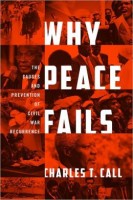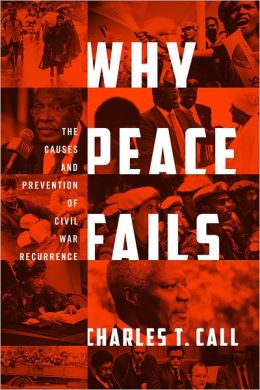 Author: Charles T. Call
Author: Charles T. Call
Publisher: Georgetown University Press – 315 pages
Book Review by: Paiso Jamakar
This book presents research studies and data on numerous civil wars that have occurred around the world for the past over six decades from 1944 to 2007, and examines the reasons why many of them they did not end in lasting peace but recurred later.
Why is it necessary to study why peace fails? The author cites four important reasons
(we quote his own words so you’ll know exactly why civil wars recur and why it is so important to achieve lasting peace):
- Civil wars are devastating – during the past 15 years, from 1997 to the publication of this book in 2012 – civil wars have caused more deaths than any other form of organized violence, including genocide, international wars, and terrorism.
- Renewed conflict is destructive for the populations that are once again uprooted after beginning to rebuild, that again fear for their loved ones’ survival, and that see fragile economic regeneration evaporate.
- These cases represent a new burden for international peacekeeping. Many observers are familiar with cases where international troops have been redeployed after peacekeepers withdrew amid failure.
- These cases go to the heart of the contemporary peace-building challenge: How, in the wake of bloody war, can external actors help foster a society that can resolve its conflicts without recourse to mass violence?
Charles Call writes that there is no one single factor behind success in building peace and preventing civil war from recurring. Instead, there are many reasons why peace lasted in those cases where war did not erupt again.
However there seems to be one common and primary (but not complete) factor that plays “a more common causal role in civil war recurrence than others.” That factor is political (not economic or social) exclusion of one or more of the parties in a civil war. This has been demonstrated also in converse terms. When there has been political inclusion, civil war has not occurred again.
Such political inclusion as a reason for lasting peace includes arrangements between or among former warring factions for sharing power. Power sharing has been given to former enemy leaders thru participation in state administration, in the form of appointive posts, or elective office.
The author points out from the results of his studies that power sharing should have two important characteristics to prevent civil war recurrence:
- Power sharing should be in the processes of government rather than policy decisions
- Power sharing should not violate the expectations of a former opponent in a civil war
There are several other conclusions derived from the studies of the features of the numerous civil wars enumerated and discussed in this book:
The nature of peace and the factors that shape peace depend in important ways on the global normative context. The research findings revealed that how wars ended during the Cold War, and the role of inclusionary behavior, were not the same as after the Cold War.
This book makes a very important contribution to achieving lasting peace by presenting data from research undertakings that show what factors have prevented civil wars from recurring and what factors have caused and contributed to permanent peace.
Leaders of countries often end wars but don’t strive to prevent their recurrence after a peace deal. They would do well to read this book, learn from the lessons it provides and implement the findings and conclusions actively to achieve harmony on a permanent basis.
A 25-page long list of reference works is cited at the end by the author for further study.
Charles T, Call is an assistant professor in the School of International Studies at American University, He was previously a senior fellow at the U.S. Institute of Peace and is the editor of Building States to Build Peace and Constructing Security and Justice after War. He has conducted research in Afghanistan, Bosnia, Central America, Chechnya, Colombia, Haiti, Kosovo, and West Africa.







